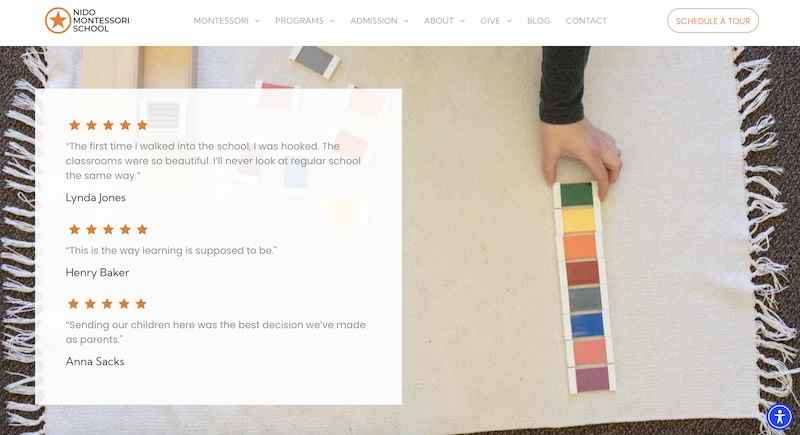Building Trust and Credibility: Leveraging Testimonials and Reviews in Montessori Marketing

Montessori schools face the ongoing challenge of distinguishing themselves, attracting prospective families, and showing families the benefits of the Montessori approach and philosophy. While traditional marketing tactics play a role in growing enrollment, building trust and credibility is key.
One powerful tool in achieving this is through the strategic use of testimonials and reviews. These authentic accounts from current and former families serve as compelling social proof of a Montessori school's effectiveness and lifetime impact. Reviews and testimonials are a crucial aspect of Montessori marketing.

The Importance of Testimonials in Montessori Marketing
Testimonials are more than just glowing endorsements; they are narratives of real experiences that resonate with prospective families on an emotional level. In the context of Montessori education, where the philosophy emphasizes individualized learning, community engagement, and holistic development, testimonials provide invaluable insights into how a school embodies these principles in practice. They offer reassurance to parents who may be unfamiliar with Montessori methods, helping to alleviate doubts and build confidence in their decision-making process.
Moreover, testimonials serve as a form of social proof, demonstrating to prospective families that others have had positive experiences and benefited from enrolling their children in a Montessori school. Word of mouth is crucial in the education space. Every Montessori school should aim to have a collection of testimonials that can be used throughout their marketing materials.
Collecting Testimonials from Families
Montessori schools can proactively collect testimonials from current and former families through various methods:
-
Direct Outreach: Reach out to families via email, phone calls, or in-person conversations to request feedback about their experiences with the school. Ask open-ended questions that encourage detailed responses, such as "What has been the most meaningful aspect of your child's Montessori education?"
-
Surveys and Feedback Forms: Create online surveys or feedback forms that allow families to share their thoughts and opinions anonymously. Include specific prompts related to different aspects of the school experience, such as academic growth, social-emotional development, and community involvement.
-
Parent Testimonial Events: Host events or focus groups where parents are invited to share their experiences and insights in a supportive and collaborative setting. Provide opportunities for families to interact with each other and share stories about their journey with Montessori education.
-
Written Submissions: Encourage families to submit written testimonials or reviews via email, social media, or the school's website. Offer guidance on what to include in their testimonials, such as specific anecdotes, achievements, or transformative moments.
-
Parent Ambassadors: Work with current or past school families who are willing to answer prospective parent questions or attend open house events. They can give testimonials in person and talk to families about their personal experiences with your school's programs and approaches.
- Video Testimonials: Ask families that are thriving in your community if they would be interested in sitting down for a short video and sharing their experience with your school. Video testimonials can feel very personal and moving and can be a great way for you to share success stories with prospective families.
Leveraging Testimonials Across Marketing Channels
You can utilize testimonials in several different ways when it comes to marketing your Montessori school. Capitalize on sharing your success stories by sharing them across several platforms and throughout your marketing materials.
-
School Website: Feature testimonials prominently on the school website's homepage and a dedicated testimonials page. Incorporate quotes, photos, and videos from families to create an engaging and authentic showcase of the school's impact.
-
Social Media Platforms: Share testimonials regularly on social media platforms such as Facebook, Instagram, and Twitter. Create visually appealing graphics or posts that highlight individual testimonials and encourage engagement from followers.
-
Print Materials: Include testimonials in print materials such as brochures, flyers, information packets, and newsletters distributed to prospective families. Use testimonials to reinforce key messages and highlight the unique benefits of a Montessori education.
-
Email Campaigns: Incorporate testimonials into email campaigns targeted at prospective families. Share success stories, testimonials, and case studies that showcase the positive outcomes of a Montessori education and encourage families to schedule a tour or consultation.
-
Online Review Platforms: Encourage satisfied families to leave positive reviews on popular online review platforms. Google Reviews is no longer available to schools, but there are several alternative platforms that you can ask families to submit a review for such as GreatSchools.org, Niche.com, PrivateSchoolReview.com, and Winnie.com. You can read more about alternative review platforms for schools on our earlier blog here.
Testimonials and reviews play a vital role in Montessori marketing by building trust, credibility, and social proof. By collecting authentic testimonials from families and strategically leveraging them across various marketing channels, Montessori schools can effectively communicate their value proposition and attract prospective families who share their educational philosophy and goals.
We can help you utilize reviews strategically throughout your school website with our Montessori Website Service.



0 comments
Leave a comment